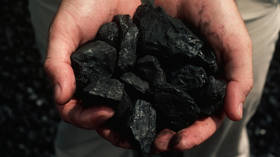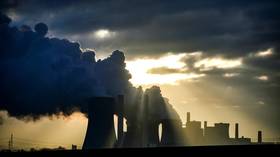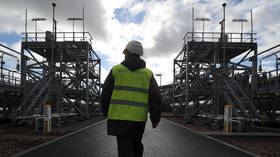EU steps back into coal age – media

A number of EU countries have launched emergency plans aimed to lower and ration the use of natural gas and resurrect coal-fired power production, Business Insider reported on Tuesday.
This week, Germany, Austria, and the Netherlands announced that coal-generated power could help them cope with an energy crisis in the coming winter. German Vice Chancellor and Economy Minister Robert Habeck said the country made a “bitter” decision to restart coal power plants.
“But if we don’t do it, then we run the risk that the storage facilities will not be full enough at the end of the year towards the winter season. And then we are blackmailable on a political level,” he stated, as cited by Reuters. Austria also announced that it would be converting a gas-fired power plant to run on coal in case of emergencies, while the Netherlands removed its limit on coal-generated energy production.
Reports also indicate that Italy’s coal-fired power plants have been stocking up on coal over the last few months.
Meanwhile, the Netherlands and Denmark on Monday also announced emergency plans that imply gas rationing in case of supply shortages. Italy is also mulling over declaring a state of alert on energy, Reuters reported, citing sources, which means the country could also start rationing gas to industrial users. Germany and Austria have already launched emergency plans of a similar nature.
The shift from EU’s coal-free ‘green energy’ aspirations to the ‘dirty fuel’ came after the bloc’s major gas supplier, Russia’s Gazprom, slashed deliveries by 60% last week through the Nord Stream pipeline. This happened after German maintenance provider Siemens failed to return pumping units from repairs in Canada, due to Ottawa’s anti-Russia sanctions.
Russia has stressed that the move was due to purely technical reasons, as the facility that pumps gas from Russia to Germany and further into Europe is unable to perform at normal capacity, with only three pumping units out of eight in operation.
“We have gas, it is ready to be delivered, but the Europeans must give back the equipment, which should be repaired under their obligations,” Kremlin spokesman Dmitry Peskov said on Monday, as cited by Reuters.
European officials, however, have slammed the decision as political. The bloc relies on Russia for 40% of its natural gas needs and the cut in deliveries poses a threat to the EU’s energy security. The demand for natural gas is quite high in the region at the moment, as the summer heat forces Europeans to step up the use of cooling systems. However, the situation may worsen closer to the winter months, when the heating season consumption is much higher.
For more stories on economy & finance visit RT's business section














